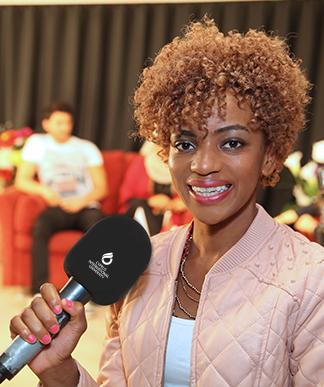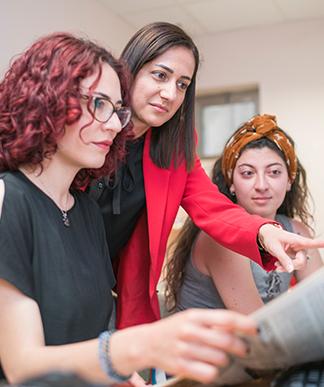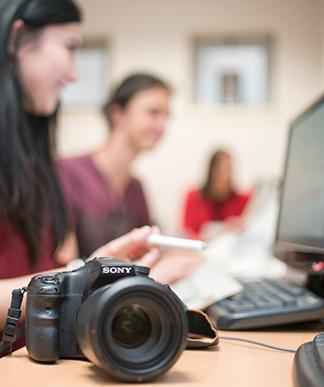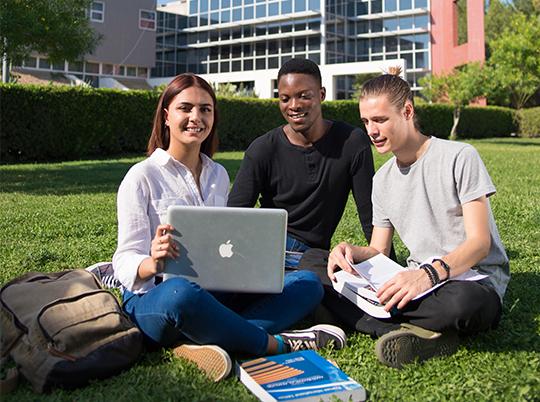


About the Program
The Journalism Program at CIU aims to prepare students for a career in the modern news media and to help them reach their potential as journalists. Our courses give students a comprehensive background in the history and theory of journalism, while developing their skills in writing and reporting. In addition, students study news photography, page design and video production, providing them with a broad range of skills which they can use in the modern newsroom.
Education Opportunities
During the academic year, visits are organized to national newspapers and agencies in North Cyprus and media professionals, as well as experts from the field being invited to contribute to classes. Writers, managing editors, news editors, page designers, photographers and photo editors also attend panels, seminars, conferences, and workshops for the benefit of the students. Students also gain practical experience of professional working environments through two internship placements, taken in the final two years of study.

Career Areas
Students graduating from the Journalism Program are able to find employment at print, broadcast and online media organizations, to work in public relations at government or private-sector organizations, or to continue their academic careers at universities. Being fluent in both spoken and written English, they are also able to work for international agencies and companies. Great journalists are experts with language: they can write simply and fluently and are able to report and to edit written and audio material. They can become reporters in the fields of news, sports, economics, politics, nature, motoring, technology, and health, as well as photo editors, visual directors, executive editors, news managers, news coordinators and broadcast coordinators. Opportunities abound for dedicated and enthusiastic journalism graduates.
Contact
Faculty of Communication
Çevik Uraz Center, CU124
Tel: +90 392 671 1111 Extension: 2301
Faculty E-mail: secretary-foc@ciu.edu.tr
Acting Head of Department: Asst. Prof. Dr. Göral Erinç FUNDALAR
Head of Department E-mail: gercan@ciu.edu.tr
Compulsory Courses
First Semester
INTRODUCTION TO MASS COMMUNICATION
Course code
COMM101Credit
3Theoretical
3Practical
0Ects
4MEDIA LITERACY
Course code
COMM133Credit
3Theoretical
3Practical
0Ects
4MICROECONOMICS
Course code
ECON101Credit
3Theoretical
3Practical
0Ects
7READING AND WRITING SKILLS-I
Course code
ENGL141Credit
3Theoretical
2Practical
2Ects
4INTRODUCTION TO COMPUTERS
Course code
ITEC110Credit
3Theoretical
3Practical
0Ects
4SOCIOLOGY
Course code
SOCY101Credit
3Theoretical
2Practical
0Ects
5TURKISH LANGUAGE
Course code
TREG100Credit
0Theoretical
2Practical
0Ects
2TURKISH
Course code
TURK100Credit
0Theoretical
2Practical
0Ects
2Second Semester
INTRODUCTION TO NEW MEDIA
Course code
COMM104Credit
3Theoretical
3Practical
0Ects
4INTRODUCTION TO CULTURAL STUDIES
Course code
COMM144Credit
3Theoretical
3Practical
0Ects
4READING AND WRITING SKILLS-II
Course code
ENGL142Credit
3Theoretical
2Practical
2Ects
4HISTORY OF CIVILIZATION
Course code
HIST100Credit
0Theoretical
2Practical
0Ects
2INTRODUCTION TO JOURNALISM
Course code
JOUR102Credit
3Theoretical
3Practical
0Ects
4PSYCHOLOGY
Course code
PSYC110Credit
3Theoretical
3Practical
0Ects
6INTRODUCTION TO RADIO
Course code
RTVC101Credit
3Theoretical
2Practical
2Ects
6MODERN TURKISH HISTORY
Course code
TARH100Credit
0Theoretical
2Practical
0Ects
2Third Semester
INTRODUCTION TO ADVERTISING AND PUBLIC RELATIONS
Course code
ADPR201Credit
3Theoretical
3Practical
0Ects
5INTERCULTURAL COMMUNICATION
Course code
COMM253Credit
3Theoretical
3Practical
0Ects
5HISTORY OF COMMUNICATION
Course code
COMM261Credit
3Theoretical
3Practical
0Ects
6ADVANCED READING AND WRITING SKILLS-I
Course code
ENGL241Credit
3Theoretical
2Practical
2Ects
4INTRODUCTION TO TELEVISION
Course code
RDTV201Credit
4Theoretical
3Practical
2Ects
6STATISTICS
Course code
STAT203Credit
3Theoretical
3Practical
0Ects
4Fourth Semester
PRINCIPLES OF MANAGEMENT
Course code
BUSN250Credit
3Theoretical
3Practical
0Ects
6THEORIES OF MASS COMMUNICATION
Course code
COMM212Credit
3Theoretical
3Practical
0Ects
5WRITING FOR MASS COMMUNICATION
Course code
COMM222Credit
3Theoretical
3Practical
0Ects
5ADVANCED READING AND WRITING SKILLS-II
Course code
ENGL242Credit
3Theoretical
2Practical
2Ects
4MEDIA LAW AND ETHICS
Course code
ILAW242Credit
3Theoretical
3Practical
0Ects
5AREA ELECTIVE
Course code
JOURXX1Credit
3Theoretical
3Practical
0Ects
5Fifth Semester
BASIC PHOTOGRAPHY
Course code
COMM231Credit
4Theoretical
3Practical
2Ects
6COMPUTER AIDED VISUAL DESIGN
Course code
COMM341Credit
3Theoretical
2Practical
2Ects
5SUMMER TRAINING-I
Course code
JOUR200Credit
0Theoretical
0Practical
0Ects
5NEWS WRITING-I
Course code
JOUR321Credit
3Theoretical
3Practical
0Ects
5FEATURE AND EDITORIAL WRITING
Course code
JOUR371Credit
3Theoretical
3Practical
0Ects
5UNIVERSITY ELECTIVE
Course code
UNIEXX1Credit
3Theoretical
3Practical
0Ects
4Sixth Semester
SOCIAL MEDIA IN COMMUNICATION
Course code
COMM254Credit
3Theoretical
3Practical
0Ects
5ADVANCED PHOTOGRAPHY
Course code
COMM332Credit
3Theoretical
2Practical
2Ects
6PHOTOJOURNALISM
Course code
JOUR342Credit
3Theoretical
3Practical
0Ects
5AREA ELECTIVE
Course code
JOURXX2Credit
3Theoretical
3Practical
0Ects
5RADIO-TV NEWS WRITING AND REPORTING
Course code
RTVC332Credit
3Theoretical
2Practical
2Ects
5UNIVERSITY ELECTIVE
Course code
UNIEXX2Credit
3Theoretical
3Practical
0Ects
4Seventh Semester
POLITICAL ECONOMY AND MEDIA
Course code
COMM457Credit
3Theoretical
3Practical
0Ects
5RESEARCH METHODS FOR SOCIAL SCIENCES
Course code
EASC270Credit
3Theoretical
3Practical
0Ects
5SUMMER TRAINING-II
Course code
JOUR300Credit
0Theoretical
0Practical
0Ects
5NEWS WRITING-II
Course code
JOUR421Credit
3Theoretical
3Practical
0Ects
4PAGE DESIGN-I
Course code
JOUR431Credit
3Theoretical
2Practical
2Ects
6AREA ELECTIVE
Course code
JOURXX3Credit
3Theoretical
3Practical
0Ects
5Eighth Semester
MAGAZINE WRITING AND REPORTING
Course code
JOUR422Credit
3Theoretical
3Practical
0Ects
6PAGE DESIGN-II
Course code
JOUR432Credit
3Theoretical
3Practical
0Ects
6JOURNALISM CASE STUDIES
Course code
JOUR450Credit
3Theoretical
3Practical
0Ects
5ONLINE JOURNALISM
Course code
JOUR456Credit
3Theoretical
3Practical
0Ects
4GRADUATION PROJECT
Course code
JOUR480Credit
3Theoretical
3Practical
0Ects
4AREA ELECTIVE
Course code
JOURXX4Credit
3Theoretical
3Practical
0Ects
5Elective Courses
GLOBAL JOURNALISM
Course code
JOUR433Credit
3Theoretical
3Practical
0Ects
5JOURNALISM GENRES
Course code
JOUR454Credit
3Theoretical
3Practical
0Ects
5POLITICAL JOURNALISM
Course code
JOUR381Credit
3Theoretical
3Practical
0Ects
5INVESTIGATIVE REPORTING
Course code
JOUR462Credit
3Theoretical
3Practical
0Ects
5FILM ANALYSIS
Course code
RTVC342Credit
3Theoretical
3Practical
0Ects
5INTERVIEW TECHNIQUES
Course code
JOUR455Credit
3Theoretical
3Practical
0Ects
5DOCUMENTARY PRODUCTION
Course code
RTVC302Credit
3Theoretical
2Practical
2Ects
5PUBLIC ADDRESS
Course code
COMM322Credit
3Theoretical
3Practical
3Ects
5HISTORY OF CINEMA
Course code
RTVC361Credit
3Theoretical
3Practical
0Ects
5SOCIAL RESPONSIBILITY PROJECTS MANAGEMENT
Course code
PRAD461Credit
3Theoretical
3Practical
0Ects
5TV GENRES
Course code
RTVC411Credit
3Theoretical
3Practical
0Ects
5VISUAL LITERACY
Course code
RTVC467Credit
3Theoretical
3Practical
0Ects
5CREATIVITY IN ADVERTISING
Course code
PRAD324Credit
3Theoretical
2Practical
2Ects
6SHORT FILM PRODUCTION
Course code
RTVC464Credit
3Theoretical
2Practical
2Ects
5INTRODUCTION TO DIRECTING
Course code
RDTV401Credit
4Theoretical
3Practical
2Ects
6EDITING
Course code
RTVC365Credit
3Theoretical
2Practical
2Ects
5MARKETING RESEARCH IN ADVERTISING
Course code
PRAD429Credit
3Theoretical
3Practical
0Ects
5POLITICAL COMMUNICATION
Course code
PRAD453Credit
3Theoretical
3Practical
0Ects
3BROADCAST JOURNALISM
Course code
RTVC331Credit
3Theoretical
2Practical
2Ects
5RADIO AND TV MANAGEMENT
Course code
RTVC452Credit
3Theoretical
3Practical
0Ects
5CONTEMPORARY WORLD CINEMA
Course code
RTVC431Credit
3Theoretical
3Practical
0Ects
5SOCIAL MEDIA APPLICATIONS
Course code
PRAD459Credit
3Theoretical
3Practical
0Ects
5PUBLIC RELATIONS CASE STUDIES
Course code
ADPR350Credit
3Theoretical
3Practical
0Ects
5FILM GENRES
Course code
RTVC466Credit
3Theoretical
3Practical
0Ects
5DIGITAL VIDEO PROCESSING
Course code
COMM403Credit
3Theoretical
2Practical
2Ects
6TR Applicants
TR Students who are successful in the exams conducted by the Higher Education Council Student Selection and Placement Center (ÖSYM) and are entitled to enroll in our university in line with their preferences can complete the registration process with the necessary documents for registration from our Registration and Liaison Offices throughout Turkey or from the Marketing Directorate on campus.
Click for detailed admission requirements information.
TRNC Applicants
TRNC citizens and TR citizen candidate students who have completed their entire high school education in TRNC. They are placed in undergraduate programs in line with their success in the CIU Student Placement and Scholarship Ranking Exam and the programs they prefer.
Students who are successful in the exam can register from the TRNC Marketing Office.
Applicants can directly apply online to our undergraduate programs by using the application portal. Please fill in your details correctly and upload all the required documents listed on the last page of the application form.
Required documents;
- Completed application form,
- Higher/Secondary Certificate or equivalents (e.g. O/A’Level, WAEC/NECO)
- Evidence of English Language competence: TOEFL (65 IBT) or IELTS (5.5). Students without these documents will take the CIU English proficiency exam on campus following arrival,
- Scanned copy of international passport/birth certificate,
- Fully completed and signed CIU Rules and Regulations document (which can be downloaded during the online application).
Cyprus International University provides academic scholarships for its students as an incentive for success, with most students benefiting from 50%, 75% or 100% scholarships or discounted tuition fees. Click for more information.
Tuition Fees are determined at the beginning of each academic year. Candidate students who are entitled to enroll in CIU can learn their fees in line with the Tuition Fee Calculation system.